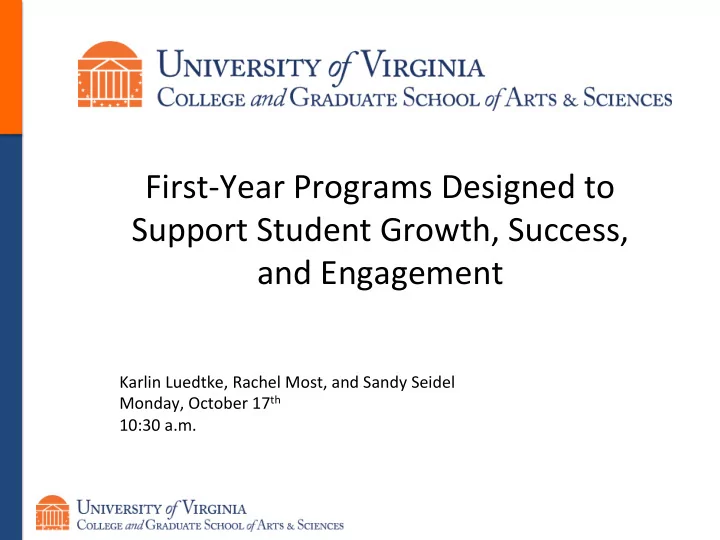

First-Year Programs Designed to Support Student Growth, Success, and Engagement Karlin Luedtke, Rachel Most, and Sandy Seidel Monday, October 17 th 10:30 a.m.
P RESENTATION O UTLINE I. Overview of Five Major Changes to First-Year Programming at U.Va. A. Mindfulness pracTces and opportuniTes B. EQi-2.0 assessments in advising seminars C. ePorXolio classes D. Advising seminars on the value of a liberal arts educaTon E. S trategies for Academic Success and Leadership : New first- year course II. IntroducTons III. Group AcTvity on First-Year Programs
Mindfulness: Awareness and Habit College Advising Seminar (COLA 1500) Fall 2016 taught in residence hall • experienTal mindfulness pracTces – body scan, si`ng meditaTon, • mindful movement, eaTng, walking – and discussion aaendance at other pracTces* on campus • reflecTve final paper • Mindfulness Prac<ces Interdisciplinary Seminar (INST 2500) Spring 2015, Spring 2016 • taught in the residence hall of residenTal college • experienTal pracTces and discussion • 2 reflecTve papers
What is Emo+onal Intelligence? “A set of emoTonal and social skills that influence the way we perceive and express ourselves, develop and maintain social relaTonships, cope with challenges, and use emoTonal informaTon in an effecTve and meaningful way.” (Also see books and ar<cles by Daniel Goleman)
EmoTonal Intelligence Model
What is an ePor5olio? • A collecTon of digiTzed student work organized and repurposed to demonstrate a student’s accomplishments, talents, experiences, and reflecTons. • Collected over Tme, and (re)composed for parTcular audiences such as instructors, prospecTve employers, or others, the ePorXolio serves as a rich evidence-based documentaTon of authenTc student accomplishments. • The ePorXolio can also ensure students gain insight on themselves as learners by showing their self-assessment as well as their aspiraTons and future goals. • Skills developed for maintaining an ePorXolio can lead to life-long learning and reflecTon processes.
Embracing Your Liberal Arts Experience College Advising Seminar (COLA) Fall 2015; Fall 2016 • Readings included Fareed Zakaria’s 2015 In Defense of a Liberal Educa<on and Tim Elmore’s Habitudes: The Art of Naviga<ng Transi<ons • Discussion based class, including small groups/paired conversaTons • Engaged AcTvity assignments • Required meeTng and talking with faculty, administrators, and peers within the U.Va. Community • Eqi-2.0 assessment • Self-reflecTve assignments • Journal Entries • Exercises for each Habitude image Course EvaluaTons
Strategies for Academic Success and Leadership Seminar in Engaging the Liberal Arts (ELA) Spring 2015; Spring 2016 • Readings included Stefanie Weisman’s The Secrets of Top Students ; readings on Tme and stress management; and Tim Elmore’s Habitudes: The Art of Naviga<ng Transi<ons • Discussion based class, including small groups/paired conversaTons • Engaged AcTvity assignments • Required meeTng and talking with faculty, administrators, and career counselors • Self-reflecTve assignments • Journal Entries • Exercises for each Habitude image Course EvaluaTons
INTRODUCTIONS to those around you (aisle or table) • Name • InsTtuTon • PosiTon
Group AcTvity on Developing & ImplemenTng First-Year Programs (4-6 people per group): I. Community College (<10,000 students) II. Community College (>10,000 students) III. Private, four-year college (<4,000 students) IV. Private, four-year college (>4,000 students) V. Public, four-year college (<15,000 students) VI. Public, four-year college (>15,000 students)
Group AcTvity: I. Step One: Think ‘BLUE SKY’ II. Step Two: IdenTfy/Discuss Barriers to implementaTon III. Step Three: Brainstorm Ways to Overcome Barriers IV. Step Four: Report Out to Larger Group
TAKE AWAYS: I. Gain exposure to one insTtuTon’s aaempts to enhance the first-year through curricular innovaTon and expansion II. Gain exposure to aaempts being made at other insTtuTons to enhance the first-year experience, including the obstacles and successes they have encountered III. Leave the discussion with one new substanTve idea to help first-year students flourish
Karlin Luedtke kl5k@virginia.edu Rachel Most rm5f@virginia.edu Sandy Seidel ss5yr@virginia.edu
Recommend
More recommend